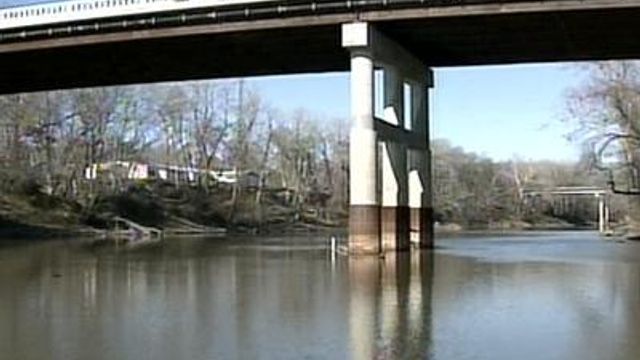Hope Mills Mayor Advocating Reservoir Project as Resource for the Future
Fayetteville's water system relies heavily on the Cape Fear River, and neighboring mayor thinks some water insurance would be a wise investment.
Posted — UpdatedCumberland County communities, including Fayetteville, rely heavily on the Cape Fear River. The area expects a flood of new growth in coming years, so some officials are looking to tap into what are now some dried-up lakes.
"Well, the river levels have been low, but we still have plenty of water,” said Carolyn Justice-Hinson of the Fayetteville Public Works Commission.
Officials in Hope Mills, which gets its water from Fayetteville, said they think several empty lakes should become reservoirs to provide a back-up supply in case the Cape Fear River gets too stressed.
Fayetteville's not so sure.
"I'm not talking about something for today. I'm talking about something 25 or 30 years from now,” Hope Mills Mayor Eddie Dees said.
Dees said the creeks that feed Hope Mills Lake and nearby Lake Upchurch would prove a reliable water supply if the Cape Fear River gets overworked. The lakes dried up in 2003 when their dams broke during heavy rains, but they're coming back.
A local group raised funds to repair the Hope Mills dam, and state and local funds brought the total project to about $10 million.
"There's never been a loss of water in either one of those two creeks. Of course, they powered two mill plants back in the day,” Dees said.
As Cumberland County's largest water provider, the Public Works Commission has expressed concern about whether it's necessary to turn the lakes into water sources – and about what it would cost.
PWC officials believe that using the lakes would require building a new treatment plant, and that has a price tag of about $35 million.
It's not that it's a bad idea.
"Fayetteville is already very fortunate to have two water sources, but another one couldn't hurt,” Justice-Hinson said.
The current sources are the Cape Fear River and Glenville Lake.
"It could be expensive to connect, but that's not saying this project would not be beneficial for other communities,” said Justice-Hinson.
"If we could all work together and come up with the funds necessary, I think it would be something that could help us out down the road,” Dees said.
A 1999 study of the feasibility of having a reservoir in Cumberland County showed a flow of 75 million gallons of water a day in the creeks feeding Hope Mills Lakes No. 1 and No. 2 and Lake Upchurch.
Hope Mills Lakes No. 1 and No. 2 are up for consideration for reservoirs, along with Lake Upchurch. Hope Mills No. 1 is expected to be restored by late summer; Lake Upchurch by March. There is currently no restoration project under way for Hope Mills No. 2.
Dees said the lakes could also provide hydroelectric power for the region. He said there was not an urgent need for the reservoirs, but he wanted to be proactive.
“I think statewide, we do [need the reservoirs],” he said. “Of course, this drought has been going on since 2002 and it doesn’t seem to be getting any better.”
Last week, Dees met with county and state representatives about the reservoir project. He said local, state and federal funding would be required to pay for it.
• Credits
Copyright 2024 by Capitol Broadcasting Company. All rights reserved. This material may not be published, broadcast, rewritten or redistributed.





